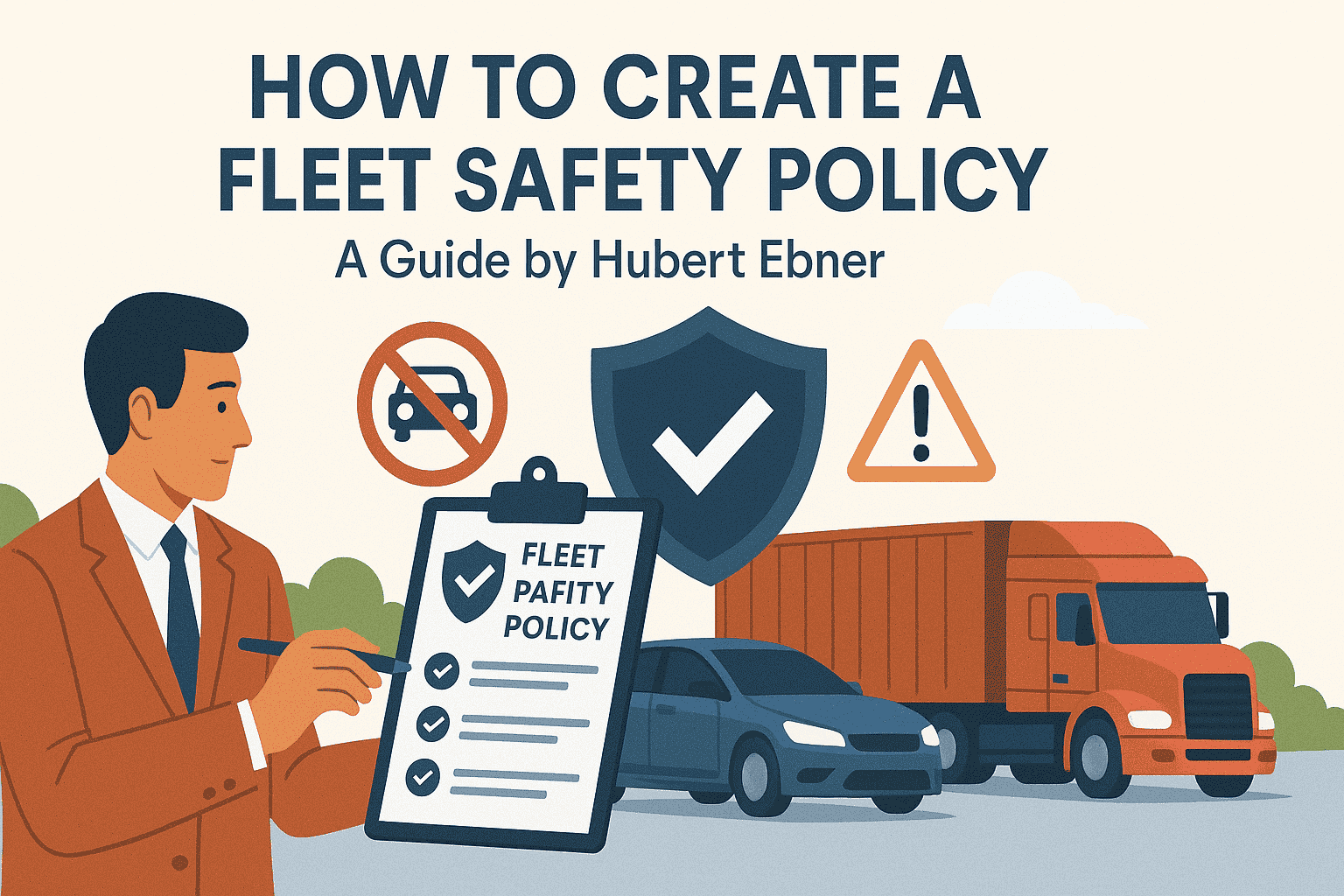🚛 How to Create a Fleet Safety Policy – A Step-by-Step Guide for Indian Businesses
Managing a fleet of vehicles—whether for logistics, employee transport, or last-mile delivery—comes with tremendous responsibility. Accidents, injuries, traffic violations, and vehicle damage not only cause financial losses but also tarnish a company’s reputation.
A Fleet Safety Policy helps prevent these risks by establishing clear rules, expectations, and training standards for drivers and fleet managers.
At Hubert Ebner India, we specialize in corporate driver training and fleet risk assessment, helping businesses build a safety-first culture. Here’s a comprehensive guide on how to create and implement a fleet safety policy that works.
🚦 What Is a Fleet Safety Policy?
A Fleet Safety Policy is a written document outlining the procedures, responsibilities, and safety practices for all drivers and vehicles used by a company. It ensures:
- Legal compliance with Indian Motor Vehicle rules
- Reduced accidents and vehicle downtime
- Improved driver behavior and accountability
- Standardized training and vehicle inspection routines
It applies to all types of fleets: cars, trucks, buses, vans, and two-wheelers.
🧱 Key Components of a Fleet Safety Policy
Creating a solid policy involves defining structure, responsibilities, and risk controls. Here’s what your policy should include:
1. 🏢 Policy Objectives and Scope
Begin by defining the purpose of the policy. For example:
“To promote a safe and responsible driving culture that protects employees, the public, and company assets while complying with traffic laws.”
Also, specify:
- Who the policy covers (drivers, vehicle operators, contractors)
- What types of vehicles are included (owned, leased, rented, employee-owned)
2. 👨⚖️ Roles and Responsibilities
Assign clear responsibilities to:
- Fleet managers – vehicle inspection, route planning, compliance
- Drivers – safe operation, reporting issues, following procedures
- Supervisors – monitoring performance and supporting training
- HR/Admin – recordkeeping, disciplinary action, accident reports
Include a line of authority for incident reporting and policy violations.
3. 🚗 Driver Selection & Onboarding
Outline how drivers will be:
- Screened (license check, prior accidents, background)
- Trained (road safety, fatigue management, defensive driving)
- Tested (medical fitness, driving tests, traffic rule knowledge)
Hubert Ebner India offers driver onboarding assessments to help filter and train the right candidates before they get behind the wheel.
4. 📋 Driver Conduct and Safe Driving Practices
Clearly define what is expected from drivers:
- Follow traffic rules and speed limits
- Always wear seat belts or helmets
- No use of mobile phones while driving
- Zero tolerance for driving under the influence
- No aggressive driving, overtaking, or road rage
Also include:
- Protocols for night driving and long trips
- Limitations on driving hours (to reduce fatigue)
- Rules for carrying passengers or goods
5. 🧰 Vehicle Maintenance & Inspection
Your policy should require:
- Daily walk-around checks by drivers
- Scheduled maintenance and logbooks
- Immediate reporting of defects or warning signs
- Use of checklists and inspection records
You can integrate Hubert Ebner’s vehicle inspection templates and tools into your process for better compliance tracking.
6. 📉 Accident Reporting and Investigation
Create a formal process for:
- Immediate reporting of all accidents, regardless of severity
- On-site response protocols (first aid, police reporting, photos)
- Post-accident drug or alcohol tests if required
- Internal review with corrective measures
Accident investigations should focus on root cause analysis, not blame, and feed back into driver retraining modules.
7. 🎓 Driver Training and Evaluation
Ongoing training is vital. Your policy should include:
- Periodic refresher training (quarterly or biannually)
- Use of simulators, eLearning, VR, or classroom sessions
- Performance reviews and scoring (speeding, harsh braking, etc.)
- Defensive driving and road etiquette programs
At Hubert Ebner, we offer customized training solutions for companies across India—aligned with your policy goals and vehicle types.
8. 📊 Monitoring, Telematics & Data Usage
Modern fleets can integrate GPS and telematics for:
- Speed tracking
- Route adherence
- Engine diagnostics
- Driver behavior alerts
Ensure your policy explains:
- What is being monitored
- How data will be used
- Privacy policies and driver rights
Monitoring helps create a data-driven safety culture where coaching replaces punishment.
9. ⚠️ Disciplinary Actions for Violations
Establish fair and consistent disciplinary measures:
- Verbal and written warnings
- Suspension or retraining
- Termination for serious misconduct
The goal is to encourage compliance—not fear.
10. 📁 Documentation, Records & Policy Reviews
Keep track of:
- Training records
- Maintenance logs
- Incident reports
- Driver evaluations
Review and update the policy at least once a year, or when new vehicles, routes, or legal requirements are introduced.
✅ Benefits of a Fleet Safety Policy
Implementing a structured fleet safety policy helps you:
- ✅ Reduce road accidents and downtime
- ✅ Improve employee accountability and discipline
- ✅ Lower insurance premiums and repair costs
- ✅ Increase vehicle life and operational efficiency
- ✅ Ensure compliance with Indian transport laws
📈 How Hubert Ebner India Can Help
At Hubert Ebner India, we support organizations in building and implementing effective fleet safety systems, including:
- Fleet safety policy development workshops
- Defensive driving and risk management training
- Simulator and VR-based hazard training
- Safety audits and vehicle inspection templates
- Driver behavior tracking and retraining modules
Our approach blends international safety standards with deep knowledge of Indian traffic conditions, making us the trusted training partner for corporates, logistics providers, PSUs, and schools.
🛡️ Ready to Build a Safer Fleet?
A written policy is just the beginning. With the right training, tools, and leadership, your fleet can become a model of road safety and professionalism.
Don’t wait for accidents to force change.
Let Hubert Ebner India help you design, train, and implement your custom fleet safety policy today.
📞 Contact Us for a Free Consultation or Policy Review Session.




